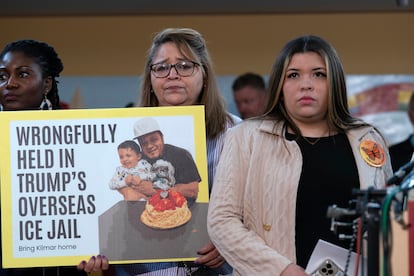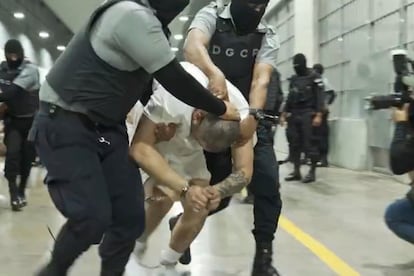Kilmar Abrego García, the worker caught in a legal limbo between Trump, Bukele and the gangs
The 29-year-old, whose deportation the government concedes was an ‘administrative error,’ awaits his fate in El Salvador’s mega-prison after the US Supreme Court stayed a district judge’s order to bring him home


“Why is he being held?” asked District Judge Paula Xinis of the Justice Department attorney at a Friday hearing on Kilmar Abrego García’s situation. “I don’t know,” the attorney, Erez Reuveni, replied. The sincerity of his answer has cost Reuveni his job, justified the court order that Abrego García should be returned to the United States, and underscored the absurdity of the case of this 29-year-old worker caught in a legal limbo between Trump, El Salvador President Nayib Bukele, and the Salvadoran gangs.
Abrego García was deported to his native El Salvador on one of the mid-March flights that carried more than 200 Venezuelans — allegedly members of the Tren de Aragua gang — and a few dozen Salvadorans — allegedly members of the Mara Salvatrucha or Barrio 18 gangs — to the maximum-security mega-prison built by the Salvadoran president. His wife, Jennifer Vásquez Sura, only learned of the incident when she recognized him, shaved and handcuffed, in news footage showing the migrants arriving at the so-called Terrorist Confinement Center (CECOT).
The expulsion, which the government has since conceded was an “administrative error,” was carried out under the Alien Enemies Act, a 1798 law that allows people to be deported in times of war if they are suspected of being part of an invading force. The law’s enforcement had been stayed by a judge, but his order was ignored by the Trump administration, which continued with its deportations. On Monday, a divided Supreme Court officially allowed these flights to go on.
Abrego García’s situation has several additional complications. The district judge said in an opinion released on Sunday that even though the legal basis for the mass expulsion of hundreds of individuals to El Salvador remains disturbingly unclear, the case of Abrego García is categorically different: “As defendants acknowledge, they had no legal authority to arrest him, no justification to detain him, and no grounds to send him to El Salvador — let alone deliver him into one of the most dangerous prisons in the Western Hemisphere.” Xinis ordered his return by midnight Monday. But on Monday, the Supreme Court temporarily blocked the order with an “administrative stay” while it further considers the government’s argument that the district judge is engaging in “district-court diplomacy” and cannot dictate how the state should relate to a foreign nation. The government has claimed its hands are tied because the suspect is no longer in U.S. custody and there is no jurisdiction to force El Salvador to return him.

All of this has happened in recent weeks, but Abrego García’s journey began about 15 years ago, when he was still living in his home country. His mother owned a pupusa stand where the whole family pitched in. Business was good, but a prosperous business in El Salvador at that time was both a blessing and curse. The Barrio 18 gang noticed and began extorting the mother: “Either pay us or we’ll take your son,” alluding to Kilmar’s older brother. The family paid the extortion fee and sent away the boy, who crossed the U.S. border illegally to escape the gang’s clutches. But the gang members weren’t satisfied and set their sights on the family’s next son, Kilmar. The story repeated itself, and between 2011 and 2012, he arrived in Maryland as an undocumented minor.
In 2016, Abrego García met his wife and became the father of her two children from a previous relationship. Three years later, according to her testimony in court, one day after learning they were expecting a child together, he went looking for a day job as a laborer, as he usually did, when the police arrived and arrested him. He denied the officers’ accusations that he was a gang member, but they didn’t believe him, and he ended up in Immigration and Customs Enforcement (ICE) custody.
He was denied bail, as it was initially deemed that there was sufficient evidence to prove he was a member of the MS-13 gang and, therefore, a danger to society. While in custody, he married Vásquez Sura through a bulletproof window. Later, after a fight from his lawyers and through ICE’s own admission, it emerged that the only “evidence” of his alleged gang membership was a document from a county police station that said that “he was wearing a Chicago Bulls cap and sweatshirt; and a confidential informer said that he was an active member of MS-13 in the Westerns clique,” alluding to a group operating on Long Island, New York. The evidence, in addition to being scant, was implausible because Abrego García had never lived on Long Island. Eventually he was released with a deportation order and a simultaneous ban on being sent back to El Salvador, as his life was in danger there.
On March 12 of this year, a new encounter with ICE agents consummated the latent fear sown since he was wrongly detained in 2019. He was driving home, and his five-year-old son, who has autism, was in the back seat when he was stopped at a roadblock. It was an immigration checkpoint. Vásquez Sura showed up shortly afterward. His immigration status had changed, he was told. “‘If you are strong, I will be strong,’ were his last words as he was being handcuffed,” Vásquez Sura declared that he told her. “In the blink of an eye, our three children lost their father, and I lost the love of my life.”

In phone calls from the three different detention centers Abrego García passed through in just a few days, he told his wife how he was constantly being interrogated about his alleged connections to the MS-13 gang, mentioning a restaurant that the family frequented, and his hobby of playing basketball. On March 15, the last call came from an immigration detention center in Louisiana. “He was scared. He told me he was going to be deported to El Salvador.” His wife hasn’t spoken to him again. But she did see him in the images that the U.S. and Salvadoran governments have shared with such pride.
Since then, Vásquez Sura has ensured that the spotlight falls on her husband’s case. First, she got the government to admit its mistake, although they washed their hands of it by saying that once he’s handed over into the custody of another country, there’s nothing more that can be done. Then, Judge Xinis ordered his return, and this past weekend she reiterated the order after an appeal from Justice Department lawyers.
But it has all been in vain. Abrego García remains in a maze from which there seems to be no way out. U.S. officials, including Vice President J. D. Vance, continue to suggest that he is a gang member, despite evidence to the contrary and the immigration agency’s own admission of error. The Supreme Court has blocked the order for his return. Legally, moreover, the United States lacks jurisdiction, so the next chapter officially depends on the Nayib Bukele administration, which also has little incentive to release a prisoner from its maximum-security mega-prison, which has been repeatedly denounced for systematic human rights violations, including torture and deaths.
But Vásquez Sura hasn’t lost hope. Speaking to NBC on Sunday, she stood firm. “I’m fighting for him. We’re all fighting. And the children are waiting for him.”
Sign up for our weekly newsletter to get more English-language news coverage from EL PAÍS USA Edition
Tu suscripción se está usando en otro dispositivo
¿Quieres añadir otro usuario a tu suscripción?
Si continúas leyendo en este dispositivo, no se podrá leer en el otro.
FlechaTu suscripción se está usando en otro dispositivo y solo puedes acceder a EL PAÍS desde un dispositivo a la vez.
Si quieres compartir tu cuenta, cambia tu suscripción a la modalidad Premium, así podrás añadir otro usuario. Cada uno accederá con su propia cuenta de email, lo que os permitirá personalizar vuestra experiencia en EL PAÍS.
¿Tienes una suscripción de empresa? Accede aquí para contratar más cuentas.
En el caso de no saber quién está usando tu cuenta, te recomendamos cambiar tu contraseña aquí.
Si decides continuar compartiendo tu cuenta, este mensaje se mostrará en tu dispositivo y en el de la otra persona que está usando tu cuenta de forma indefinida, afectando a tu experiencia de lectura. Puedes consultar aquí los términos y condiciones de la suscripción digital.








































